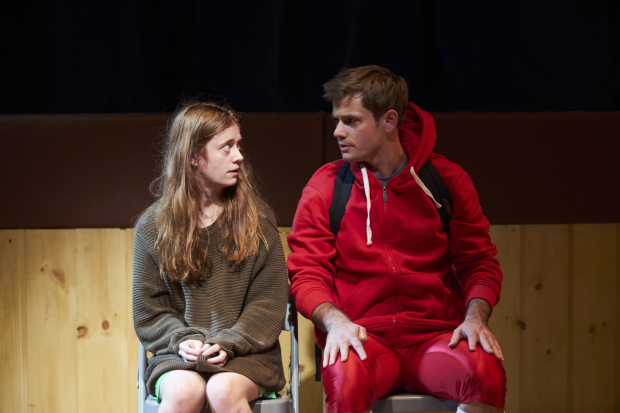The Rape of the Sabine Women, by Grace B. Matthias

(© Daniel J. Vasquez)
Shortly after Rome was founded, Romulus and his male cohorts abducted women of the neighboring Sabine tribe, fought off subsequent counterattacks from the Sabine men, and married the women they snatched from their homes.
History books still equivocate over whether to judge the Romans as cruel or courageous.
How, you ask, could that possibly be? "The men wrote the books."
At least, that's the diagnosis Michael Yates Crowley offers in his new Playwrights Realm production, The Rape of the Sabine Women, by Grace B. Matthias, his theatrical indictment of American rape culture, now running at the Duke on 42nd Street. It's a bold statement, less for its message (an astute but not particularly surprising one) and more for its messenger. As a man calling into question centuries of female narratives written by other men, Crowley puts himself and his work in the hot seat — and to his credit, doesn't squirm.
Crowley betrays no signs of apology as he takes his place in this lineage of men inscribing another woman's story — her rape story, no less — in stone. If anything, he stares into the lion's mouth writing the accounts of high school student Grace B. Matthias with comic absurdity — a dangerous game to play when it involves such an emotionally rife subject. However, with delicate direction by Tyne Rafaeli, Crowley reaps the rewards of that risk by subverting the "cautionary tale," the "victim story," and all other tropes that paint rape as something that creates a perfect victim forever ruined. Such contrived stories are what transpire when an author speaks for his characters. Here, as the title (not so subtly) projects, Grace B. Matthias speaks for herself.
Played by the outstanding Susannah Perkins (last seen in Playwrights Realm's acclaimed 2016 production of The Wolves), Grace is a fully functioning oddball who is given the awful task of recounting her rape for her lawyer (Jeff Biehl). He'd prefer she edit it down to a tale of woe, but she freely includes the details about her developing romance with a shy football player named Jeff as well as her repeated encounters with his buffoonish fellow jock Bobby, who gets a kick out of bullying the gangly Grace with names like "Pig" (Doug Harris and Alex Breaux give flesh and humor to their respective cartoonish characters).
Jeff and Bobby play for the Romans, the school's athletic heroes, and as such, have become teenage royalty (the entire set, designed by Arnulfo Maldonado as a high school auditorium, becomes the boys' kingdom). Inspired by the 2012 Steubenville case, which involved the rape of an intoxicated teenage girl by two football players, it's not difficult to see where all this entitlement and machismo are headed — nor is it difficult to predict how Grace's actions will be perceived by the public (Chas Carey frequently appears as the physical embodiment of "The News," offering the day's misogynistic headlines and advertisements).
What makes Grace and her story so compelling are her confusing internal contradictions, made completely understandable in Perkins's detailed performance. She spends the entirety of the play obsessing about her prospects as a fireman (fire being one of Crowley's more heavy-handed metaphors) despite nearly universal objections, particularly from her stereotypical cheerleader pal Monica, played to a T by Jeena Yi. And yet, Grace also imagines a world where she and her assailant can be together again, if only he extended a simple apology as she imagines the Romans did for their Sabine brides. It’s the gray area between the feminist side of Grace and the one that could lead her into a life of subservience where the insidious fire Crowley describes is burning. It's also where, according to Grace's teacher (played with comforting assurance by Andy Lucien), the story of the Sabine women has fallen and been deemed innocuous by generations of male historians.
The action leads up to Grace's class presentation on Jacques-Louis David's painting The Intervention of the Sabine Women — a moment of stand-and-deliver sermonizing and overt parallels, which Crowley all too often falls back on. However, the greatest lesson proffered by The Rape of the Sabine Women, by Grace B. Matthias is that female stories need not be contraband for male playwrights. As long as the characters are the loudest voice, anyone can write the books.










